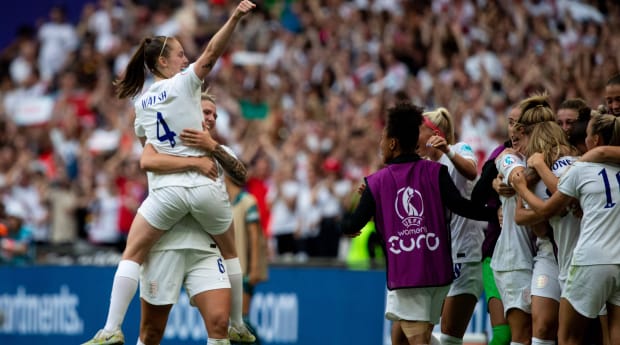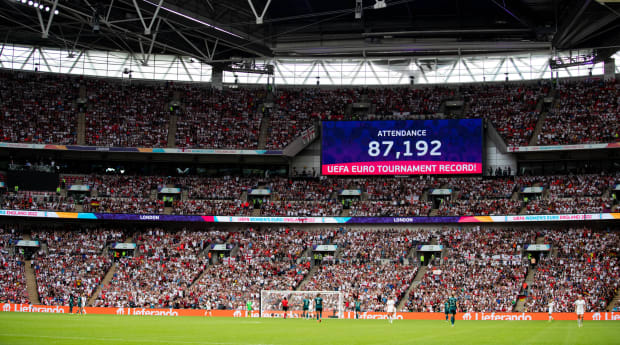For the second straight year, during another riveting July, the world of soccer was witness to the magic of a Euro final for the ages.
The arena was the same—London’s heralded Wembley—as was the favorite to win: England at home, under immense pressure and spurred on by rip-roaring home support. And once again, the drama spilled into extra time while the sterling silver of a Euro trophy sat in the distance, waiting to cure the nation’s lengthy title drought.
But this time, the premature calls of “football’s coming home” turned to prophecy, and it wasn’t the Three Lions, but the Lionesses who brought the northwest corner of London to a roar with a 2–1 victory over Germany in the Women’s Euro final.
The tournament itself will be remembered for figures like forward Beth Mead (player of the tournament, co-Golden Boot winner) and manager Sarina Wiegman, who has now won consecutive Euros with the Netherlands and England. But the final will be remembered for the magic it created and the awe it inspired within the host nation.
It was a final that reminded us why we participate in this arena to begin with—the wide smiles mixed in with the tears, the chance to witness history, the magic of the stories coming to fruition. But just as notable was the candid charm of star athletes who feel neighborly, almost as if it was you or someone you knew was lifting the trophy.

IMAGO/Sports Press Photo
At Wembley, it seemed as though the divide between fan and player faded for a moment—a rarity in sport, let alone on the stage of English soccer, where athletes make the front page just as much for what they do off the field for what they do on it.
Nowhere was it more evident than in match-winner Chloe Kelly’s pitch-side interview. After Ella Toone and Lina Magull traded second-half goals, it was Kelly’s hard-fought second effort in the 110th minute that clinched England’s first European title and led her to rip off her shirt and swing it over her head in elation.
As she answered her first question, the Man City forward broke into song as “Sweet Caroline,” the Neil Diamond anthem adopted by England fans on the run to last year’s men’s Euro final, played on the loudspeakers. Kelly bolted away from the interview to join her teammates, microphone in hand, yelling “This is unreal!” And like her goal, it was another burst of energy that will go down in England history.
And that too, is part of the magic, because one can picture fans named “Caroline” in the crowd dancing in their England shirts and listening to the masses and players yell their name, celebrating champions who looked like them and talked like them and shared a groundbreaking moment in English sporting history with them. To extend the thought further, there will now be a generation of boys and girls, alike, that will have a formative memory coming out of Wembley that no longer draws solely upon the sorrow of watching England lose a Euro final. And we must remember that is was the Lionesses, not the Lions, that curated such a moment.
For nearly an hour after the final whistle, the stadium-turned-discotech remained full of families and children and fans of all ages rocking to the usual soccer stadium hits like “Freed From Desire” and “Dancing in the Moonlight.” Even from afar, it seemed like a memory in the making, made by the masses and for the history books, one that couldn’t be more different than the nation’s penalty-kick loss to Italy in the men’s final last year.
“We go again,” Kelly told the BBC broadcast after returning the microphone. “Honestly it’s amazing, thank you to everyone who came out to support us. These are what dreams are made of. As a girl watching women’s football, and now this? Wow. It’s unbelievable.”
One gets the sense that this tournament was just as monumental for women’s soccer as it was for soccer as a whole. More than 87,000 fans gathered at Wembley for the final—the largest crowd in European championship history, men’s or women’s. In Germany, this week, more than 12 million people watched its semifinal win against France. England’s semifinal television viewership peaked at 9.3 million, whereas England’s 2009 Women’s Euro final reached 1.4 million viewers.

IMAGO/Sports Press Photo
How beautiful is it to imagine a family in the crowd, seeing the buzz outside the stadium, chanting “football’s coming home” and not constantly having to be reminded of the differences inherent to each side of the sport? That is one of the many reasons that this will be seen as a landmark tournament for the game in Europe, not for the English win alone but for the way it lifted the game (and a nation) during a summer devoid of a World Cup.
“What we’ve seen in the tournament already is that this hasn’t just been a change for women’s football but society in general, how we’re looked on,” England captain Leah Williamson told UEFA.com prior to the final. “Naturally it’s my job to go out for 90 minutes and play and win, but we’ve really started something.”
Williamson called the final “a fairytale fixture,” and yet fantasy soon became reality as Prince William hugged players and awarded first-place medals. But the storybook metaphor didn’t just extend to the players. Mere months ago, referee Kateryna Monzul was in a bunker in Kharkiv, Ukraine, for five days waiting out a Russian attack. After a journey that saw her and her family travel through six countries, Monzul found herself at Wembley, working as the head referee of the Women’s Euro final.
“It’s the moment when a dream you have comes true,” she told Sky News.
And whether it was a dream or a fairytale, it will now be history with all of these iconic moments strung together as one, another Euro final for the ages. Yet this time, it was a moment filled with magic for the hosts, one that is guaranteed to last as England’s first-ever European title.







